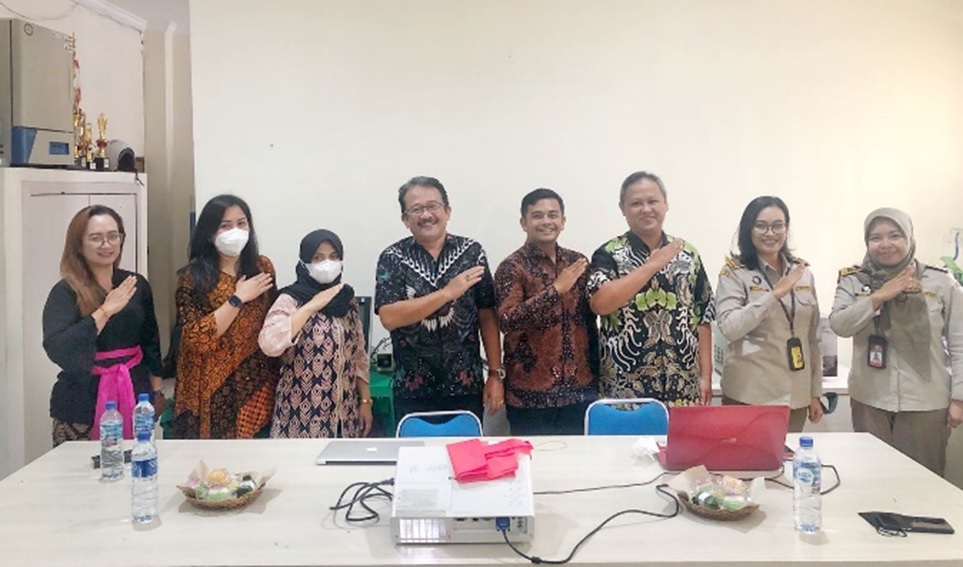Sorry, this entry is only available in Indonesia
On Thursday, October 20, 2022, at the Plant Disease Laboratory, Faculty of Agriculture, Udayana University, "Joint Monitoring of OPTK A1" was conducted between the research team of the Faculty of Agriculture, Udayana University and the Central Agricultural Quarantine Agency, Jakarta with a focus on discussion on distribution areas and the results of detection and identification of errors. one OPTK A1 Group 1, namely PRSV-W. This joint monitoring and discussion was conducted to provide an overview of the distribution of PRSV-W in Bali and to plan joint monitoring efforts in melon plantations in Bali. Offline this event was attended by the Sub-Coordinator of Export and Inter-Area Seeds of the Agricultural Quarantine Agency, Dr. Aulia Nusantara, SP, M.Sc. and team, Putu Sinta Devi, S.P.M.P. and the Denpasar Class 1 Quarantine Center team, the coordinator of the research team represented by, Dr. Gusti Ngurah Alit Susanta Wirya, SP., M.Agr. and researcher I Putu Sudiarta, S.P., M.Sc., Ph.D., Dewa Gede Wiryanngga Selayang, S.P., M.Sc., Dr. Trisna Agung Phabiola, S.P., M.Sc..
The research team coordinator, Dr. Gusti Ngurah Alit Susanta Wirya, S.P.,M.Agr., in his remarks greatly appreciated the steps taken by the Agricultural Quarantine Agency, related to the monitoring of PRSV-W which had been reported in the reputed scientific journal Indian Phytopathology. PRSV-W which is OPTK A1 Group 1 must be a joint concern between academics and the government so that its distribution can be monitored so that it does not spread to other places, explained Dr. Alit. In addition, collaboration between researchers from universities and the Agricultural Quarantine Agency is very important to maintain state sovereignty through quarantine, so it must continue to be improved, concluded Dr. Alit.
According to Dewa Gede Wiryanga Selangga, SP, M.Si, in his presentation, this report on PRSV-W is the first time in Indonesia, and is an A1 OPTK Group 1 which has never been reported in Indonesia and cannot be destroyed from the carrier media, so it has the potential affect the export and import of melon seeds. The PRSV-W was last reported in Australia and Timor Leste in 2019, concluded Dewangga.
I Putu Sudiarta, S.P., M.Sc. Ph.D., conveyed to the Agricultural Quarantine Agency that monitoring of OPTK A1 is very important because if it is not monitored for its presence in the country, it will cause a lack of information in the field, so that when found by quarantine at home or abroad it can cause losses, said Dr. Putu. He gave an example in 2019 the research team reported the presence of Bactrocera occipitalis in Bali. This report became an obstacle in the export of manga to Japan. Therefore, collaboration between all parties is very important to be encouraged.
Meanwhile, the Sub-Coordinator of Export and Inter-Area Seeds of the Agricultural Quarantine Agency, Dr. Aulia Nusantara, SP, M.Sc., expressed her appreciation to the researchers from the Faculty of Agriculture, Udayana University who have reported this finding in a comprehensive and comprehensive manner. This is very important as initial information to determine changes in OPTK data in the Ministry of Agriculture. In addition, Dr. Aulia is very open to collaboration and the role of researchers from universities to together with the Agricultural Quarantine Agency inform each other of findings in the field so that actions to maintain state sovereignty can be carried out on an ongoing basis, he concluded.
Plant Virologist, Prof. Dr. Ir. I Gede Rai Maya Temaja, M.P. hope that the ecological diversity of the virus in Indonesia can be a common concern so that the function of the Agricultural Quarantine Agency in the context of preventing the entry, spread and release of Quarantine Animal Disease Pests (HPHK) and Quarantined Plant Destruction Organisms (OPTK) from within and outside the country can run well. .
Putu Sinta Devi, S.P.M.P. and the Denpasar Class 1 Quarantine Center team is ready to collaborate with the Plant Disease Laboratory, Faculty of Agriculture, Udayana University, especially in monitoring and detection with OPTK A1 or other OPTKs that have the potential to spread in Bali.





